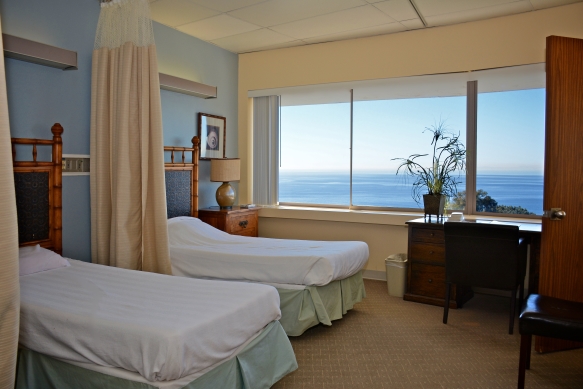
This morning I interviewed with Mental Heath Association of Orange County to be a volunteer Hearing Advocate representing clients placed on mental health holds (involuntary psychiatric hospitalization for 72-hours).
HEARING ADVOCACY – Advocates fill a legally state mandated role to ensure that involuntarily detained persons in a psychiatric hospital have the opportunity to express their views regarding hospitalization, advocates support them through the process. Advocates review patient’s charts, interview patients, and attend probable cause hearings with the patient.
Tomorrow I start my training by shadowing an MHA advocate at Mission Hospital Laguna Beach Behavioral Health Services, where in February 2005 I spent two weeks voluntarily hospitalized. No doubt being taken to the hospital involuntarily is a quite different experience than going there by choice.

Yes, the rooms have incredible views of the Pacific, as the hospital sits on Pacific Coast Highway (PCH). As a voluntary patient, I appreciated the views but was not permitted to walk to the beach until I left the hospital and entered the partial hospitalization program. After eating lunch, as outpatients we had the freedom to walk down to the beach, which we often did together as a group. Laguna Beach is truly beautiful. Unfortunately, you need quite a bit of money to live there (and traffic is horrible on PCH).
Mental Health America of California offers this excellent summary of California law regarding involuntary hospitalization on its website:
72-Hour Mental Health Hold
If you need to get help for someone who may not want help but needs it immediately, you may need to arrange for involuntary hospitalization. This process is called a “72-hour Mental Health Hold.”
Under California law, only designated personnel can place a person in 72-hour hold, often called a “515O.” They can be police officers, members of a “mobile crisis team,” or other mental health professionals authorized by their county.
One of three conditions must be present for an individual to be placed on a 72-hour hold. The designated personnel believe there is probable cause that because of a mental disorder the individual is:
- A danger to him or herself;
- A danger to others; or
- Gravely disabled (unable to provide for his or her basic personal needs for food, clothing or shelter).
The person placed in a 72-hour hold must be advised of his/her rights. The facility requires an application stating the circumstances under which the persons condition was called to the attention of the officer or professional; what probable cause there is to believe the person is a danger to others, a danger to him or herself, or gravely disabled (due to a mental disorder); and the facts upon which this probable cause is based. Mere conclusions without supporting facts are not sufficient.
What Happens During an Involuntary Hold?
When a person is detained for up to 72 hours, the hospital is required to do an evaluation of that person, taking into account his/her medical, psychological, educational, social, financial and legal situation. The hospital does not have to hold the patient for the complete 72 hours if the professional person in charge believes that the patient no longer requires evaluation or treatment.By the end of the 72 hours, one of the following things must happen:
- The person may be released;
- The person may sign in as a voluntary patient;
- The person may be put on a 14-day involuntary hold (a “certification for intensive treatment”).
Does the Person Being Held Involuntarily Have Any Rights?
Yes. A mental health patient being held involuntarily must be informed of the following rights in a language or manner he/she can understand:
- To keep and use his/her own personal possessions including toilet articles and clothing;
- To keep and be allowed to spend a reasonable sum of his/her own money (a conservator shall be appointed as required);
- To have access to individual storage space for private use;
- To see visitors each day;
- To have reasonable access to telephones;
- To have ready access to letter writing materials, including stamps & mail;
- To receive unopened mail;
- To refuse convulsive treatment;
- To refuse psychosurgery;
- To see a patients’ rights advocate;
- To be assisted by an attorney at the certification review hearing.
In addition, the patient has the right to be informed fully of the risks and benefits of the proposed treatment and give his/her informed consent. A patient has the right to refuse medication unless there is an emergency condition or the patient is found to lack capacity to make an informed decision after a judicial hearing. If, at that hearing, the patient is found to lack capacity to consent to medication, the patient may appeal the decision to the Superior Court.
Within four days after the patient is placed on a 14-day involuntary hold, there must be a certification review hearing (a “probable-cause hearing”). The hospital must present evidence as to why the patient needs further treatment. The patient, assisted by a patients’ rights advocate, can explain why he/she believes there is no need for further hospital stay. A hearing officer, court-appointed commissioner or referee will decide whether or not there is probable cause to keep the patient in the hospital against his/her will for a period not to exceed 14 days.
If the hearing officer decides there is not probable cause to hold the patient, the patient may request to remain in the hospital on a voluntary basis. If the hearing officer decides there is probable cause and the patient disagrees with the decision, he/she has the right to request a Writ of Habeas Corpus and have a hearing in the Superior Court of the county where the patient is being held.